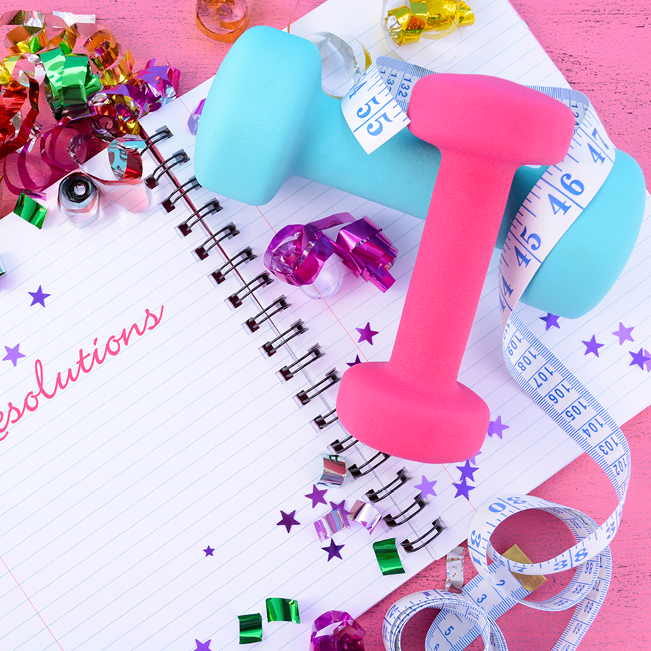
There's a new year on the calendar, and if you're like 40 percent of Americans, you've probably made at least one new year's resolution. When people make new year's resolutions, it's common for them to make ones that address their health, such as spending more time at the gym or cutting bacon from their diet.
Making a healthy new year's resolution is easy, but sometimes implementing successful change into a long-term routine can be more challenging than expected, especially when it comes to personal health. In fact, one-third of people who make new year's resolutions will break them by the end of January. So what causes people to fail when it comes to their health and wellness goals?
Most often, people can't follow through with their new year's resolutions because they haven't created realistic goals or a plan for success. To make sustainable life changes that create a healthier lifestyle, it's important to pick goals that are attainable and manageable within the parameters of your life. In fact, it's best to choose just one or two simple new year's resolutions that will help you implement gradual — but significant — changes in your lifestyle.
Not sure how to get started? Keep reading for our list of 10 simple — and healthy — suggestions for a new year and a new you.
1. Take Steps to Be More Active
A lot of people assume that being active means a daily visit to the gym, but it actually starts outside the gym. Becoming more active can simply mean looking for ways to incorporate more movement into your day. For one person, increasing activity may mean taking the stairs instead of the elevator. For another, it might mean increasing the number of steps taken during the day.
If you're someone who sits at a desk all day at work, finding these small ways to incorporate activity into your day is especially important — sitting for prolonged periods of time has been shown to increase the risk of obesity, high blood pressure and death from cancer or cardiovascular disease. If you work in an office, use break times to take a walk around the block, or opt to walk to a coworker's desk to ask a question rather than sending an email.
While these may seem like small changes, over time, they'll provide huge benefits. If you're looking for even more activity, consider joining a group fitness class. Group fitness is a great way to increase your activity levels. Besides the benefits of being active, a group fitness class also combines activity with being social — physical and mental benefits all rolled into one!
The Gateway Region YMCA offers a wide variety of fitness classes. These classes are included with a YMCA membership, allowing members to take advantage of a variety of classes as well as our family-friendly exercise facilities.
Which leads us to another simple new year's resolution.
2. Join a Gym
If you're looking for ways to incorporate activity into your day, joining a gym might be a great solution. When you join a gym, such as the YMCA, you'll gain access to a wide variety of workout equipment. Having this access is great because it encourages you to combine cardio and strength training into your workouts, both of which are essential for a healthy body.
Once you join a gym, you'll also have access to fitness classes, group fitness events and even personal training. For some people, the accountability of group workouts and one-on-one exercise can be essential to keeping healthy new year's resolution. A gym is also a great place to meet a friend or willing workout partner. In fact, a study from the Dominican University of California found that more than 70 percent of people who simply sent workout results to a friend achieved their fitness goals.
For a great gym with lots of amenities in the St. Louis area, check out your local YMCA today.
3. Spend More Time With Family

Spending more time with your family may not be as common when new year's resolution time rolls around, but choosing it as your goal can improve your overall well-being. Being with your family more will positively impact your own personal health and also have a positive impact on the rest of your family too.
When parents slow down and spend time with their family, they tend to relax and feel less stressed. Parents who spend quality time with their children are often more cooperative, friendly and cheerful. Besides that, children who regularly spend time with their parents are healthier and happier.
4. Practice Mindful Eating
Making resolutions about your diet can be a slippery slope. This time of year, we're bombarded by ads hailing the benefits of the latest diet fads, but the key to improving your diet is often to change how you eat. When you focus on what's going into your mouth and slow down between bites, you'll be less likely to overeat because you're more likely to recognize when you're full. Turn off the television, and eat each bite slowly. Over time, you'll develop more of an awareness about your food and what your body needs.
Mindful eating can also include swapping unhealthy foods for healthier options. However, rather than ditching all the foods you love at once, try incorporating one or two changes at a time. For example, if you regularly eat scrambled eggs for breakfast, add a handful of spinach or some tomatoes when you cook them. Or, try swapping a sugary beverage for a glass of water. Once you're making these small swaps consistently, add in another one. Over time, a few small swaps will add up to big dietary changes.
Whatever you do, don't completely ditch the occasional splurge. For example, you don't need to eat steak several times a week, but resolve to treat yourself to a good steak once a month. If you're a fan of chocolate, allow yourself the occasional brownie or piece of chocolate. By giving in to your cravings occasionally, you'll actually help yourself stay on track toward achieving your long-term goals.
5. Be Grateful
Take a few minutes each day to reflect on the things you're grateful for, and write them down. Reflecting on the good helps you focus and keep a positive attitude. On the tough days, going back to the things you've written down in the past can be a good reminder.
Along with being grateful, adults who turn their thankfulness into action are more likely to experience an overall sense of purpose and well-being. Whether you donate your time or your money — or both! — giving back to your community can give a huge boost to your emotional and physical health.
6. Get Some Sleep
Adults who sleep less than seven hours each night are less likely to be active and more likely to be obese. They're also more likely to suffer from a variety of health problems, including coronary heart disease, asthma, arthritis, depression and diabetes.
A healthy adult should get a minimum of seven hours of sleep on any given night, but if you haven't been getting that much, it can be intimidating to suddenly incorporate an extra hour or two into your sleep cycle. Consider going to bed just 15 minutes earlier each night. If you have to, pencil an early bedtime into your daily schedule. Once those 15 minutes become routine, add another 15 minutes, and so on until you reach your goal of seven or more hours of sleep each night.
If you're struggling to get to sleep, make sure to keep your bedroom cool and dark. Bump the thermostat down — experts recommend a cool 68 degrees for optimal sleeping — then close your curtains and dim the display on a bedside alarm clock if needed.
7. Step Away From Your Digital Devices

Being available 24/7 is stressful and can have a negative impact on your health. When we stay connected via phones, tablets and other digital devices, we become anxious, distracted and less productive. Over-attachment to our technology is also causing disrupted sleep patterns and problems with our ability to establish an emotional connection with other people.
When you decide to turn off your devices for some time each day, you're deciding to prioritize both relationships with family and friends and interests and hobbies you might not otherwise engage in.
If this step seems impossible, start small. Each day, turn the sound on your phone off for 15 minutes. Flip the phone over so that you can't see any notifications that come across the screen. During this 15 minutes, engage in another activity you enjoy — read a book, cook a meal or talk to your spouse, for instance. Once this process becomes a habit, increase the amount of time you keep the phone silent. Once 15 minutes is easy, increase the time you spend away from your screen.
If you use your phone to conduct business, either by accepting phone calls or staying connected to email, consider giving yourself digital "office hours" by scheduling the time of day you will and will not be accessible. If you need to, inform colleagues and clients of your hours. For example, let them know that any email sent after 7:00 p.m. won't be received and read before 7:00 a.m. the next morning.
8. Incorporate Self-Care Into Your Daily Routine
Self-care looks different for everyone, but the idea of self-care is to make sure you pick something to do for yourself each day. Taking time for solitude and reflection can decrease stress and improve your overall outlook. It can also set a more peaceful tone for your day, particularly if you do it first thing in the morning.
If you aren't sure where to begin, consider starting your day with meditation. Read a novel while you drink your morning coffee. Turn off your phone and simply watch the birds out your window while you eat breakfast.
If you suspect that you've neglected yourself, start small and incorporate one 10-minute self-care activity into each day. As it becomes more routine, add more time or an additional activity to your day.
9. Stop Smoking
Smoking puts you at a much higher risk for a long list of health problems. If you make every single resolution on this list but don't give up smoking, you're still putting yourself in harm's way. Take this chance to make a life-changing decision and ditch the cigarettes. Today, there are a lot of aids out there to help with quitting, so make this the year you finally break the habit once and for all.
10. Change Your Definition of What Healthy Looks Like
After spending time on those nine other resolutions, the most important thing you can do is to make sure you have the right definition of being healthy. Being healthy doesn't mean eating only vegetables. It doesn't mean working out for hours every day. It isn't a number on a scale. All of these things have their place, but being healthy is a series of small decisions that all point to one goal — to take care of the body and the life you've been given.
How to Keep Your New Year's Resolution

Keeping your new year's resolution can be challenging if you don't have a plan in place to help you achieve results. To improve your chances of succeeding with your resolutions, ask yourself these four questions:
1. What Do I Want to Achieve?
Be specific. Don't just say you want to eat healthier — define what that looks like. Will it mean eating smaller portions? Perhaps it means swapping your afternoon soft drink for a bottle of water. Maybe it means taking a walk every day on your lunch break or signing up for a weekly fitness class.
2. How Will I Measure My Progress?
To do this, look at your goal and decide how you can track your progress. For example, someone attempting to lose weight could track their progress by the numbers on the scale or the way their pants fit. For someone whose goal is to stop smoking, progress might be measured by a decrease in the number of days they have gone without smoking or tracking the money they save by not purchasing cigarettes.
3. Is My Goal Realistic?
While saving enough money to retire in five years sounds wonderful, if you're only 25 years old, it's probably not very realistic. Instead of setting yourself up to fail, make sure your goal is something you can realistically manage day-to-day. For example, instead of resolving to save enough to retire, start by resolving to save an extra $100 a month.
4. When Will I Know I've Succeeded?
Giving yourself a deadline is one way to measure your success. If your goal is to be more active, use a pedometer to measure your steps, and work your way up to a goal of 500 extra steps each day. Once you've reached that goal, celebrate your milestone.
Measurement doesn't mean you have to stop being healthy once you've met your goal. Once you succeed, set another goal, then another. Taking small steps over time will build up to big progress.
Get Healthy With the Gateway Region YMCA

Always remember to be kind to yourself. You may experience setbacks or even fall short of your goal. Don't let that discourage you. If your goal is to develop a healthier lifestyle, there's no better place to start than your local YMCA. When you join the YMCA, you're joining more than a gym. You're becoming part of a community of people who are dedicated to supporting each other in their goals to cultivate and maintain a healthy lifestyle.
You've got this. We've got you. Learn about Membership!